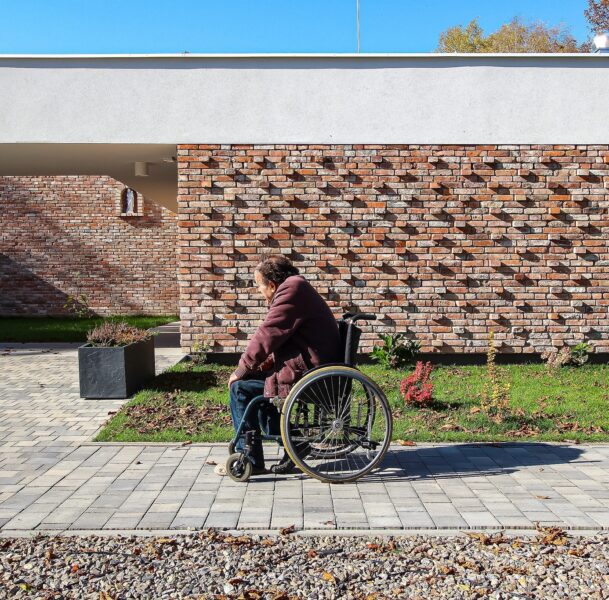
Debata online: Architecture of Radical Care, 16.11, godz. 17.00
Jak może wyglądać architektura oparta o troskę i opiekuńczość? Co musi się zmienić w naszym myśleniu o niej, aby budynki zyskiwały potencjał regeneracji planety? Zapraszamy na debatę online w języku angielskim, już dziś o godzinie 17.00.
Stopień wyeksploatowania i wyniszczenia planety, pogłębia się wraz z ciągłym wzrostem – celem dominującego globalnie systemu społeczno-ekonomicznego. Skutki prowadzenia rabunkowej gospodarki przybliżają nas do katastrofy klimatu. Jak zauważa Elke Krasny, nasza planeta wymaga natychmiastowej intensywnej terapii. Wraz z rozwojem nowoczesności i modernizmu, przez lata opieraliśmy architekturę i planowanie o idee postępu i obietnicy lepszej przyszłości, często niszcząc to, co już istniało.
Architektura i urbanistyka oparte na założeniach intensywnej opieki są punktem wyjścia, dzięki którym nie rezygnujemy całkowicie z przyszłości. Architektura powinna przezwyciężać środowiskowe i społeczne niedobory, uznawać współzależność gospodarki, ekologii i pracy oraz dążyć do budowania przyszłości istot ludzkich i nieludzkich oraz je ochraniać.
Do rozmowy zaprosiliśmy twórczynię tekstu do katalogu wystawy i redaktorkę merytoryczną współpracują przy jego powstawaniu: Elke Krasny i Dorotę Leśniak-Rychlak. Spotkanie będzie moderowane przez Dorotę Leśniak-Rychlak.
Debata odbędzie się w formie online, prowadzona będzie w języku angielskim
Widzimy się na: https://youtu.be/VV-gAU-zx5E
Elke Krasny – teoretyczka kultury i architektury, urbanistka i kuratorka. Specjalizuje się w architekturze, sztuce współczesnej, urbanistyce, muzealnictwie feministycznym, historiach i teoriach kuratorskich, krytycznych historiografiach feminizmu, polityce pamięci i ich przecięciach. Współkuratorka wraz z Angeliką Fitz wystawy “Critical Care: Architecture and Urbanism for a Broken Planet” oraz katalogu pod tym samym tytułem wydanego przez MIT Press. W swojej pracy wprowadza perspektywę opieki w kontekście architektury jako działalności antropogenicznego pochodzenia.
Dorota Leśniak-Rychlak – redaktorka naczelna kwartalnika „Autoportret. Pismo o dobrej przestrzeni” wydawanego przez MIK. Założycielka i prezeska Fundacji Instytut Architektury. Kuratorka i współkuratorka wielu wystaw architektonicznych, m.in.: Figury niemożliwe – Pawilon Polski na XIV Biennale Architektury w Wenecji, Wreszcie we własnym domu. Dom polski w transformacji, Festiwal Warszawa w Budowie, Muzeum Sztuki Nowoczesnej. Inicjatorka i redaktorka wydań publikacji z kanonu teorii i praktyki architektonicznej, m. in.: Peter Zumthor, Myślenie architekturą (Kraków: Karakter 2008), Juhani Pallasmaa Oczy skóry (Kraków: Instytut Architektura 2012) oraz Juhani Pallasmaa Myśląca dłoń (Kraków: Instytut Architektury, 2016), a także redaktorka: Teksty modernizmu. Antologia polskiej teorii i krytyki architektonicznej 1918-1981 (Kraków: Instytut Architektury 2018). W 2019 roku opublikowała książkę Jesteśmy wreszcie we własnym domu (Kraków: Instytut Architektury, 2019) poświęconą przemianom mieszkaniowym w Polsce w okresie transformacji.
_____________
What does an architecture based on attention and care look like? What needs to change in our thinking about architecture in order for buildings to gain the potential to regenerate the planet?
The degree of exploitation and destruction of the planet deepens with continued growth which is the goal of the globally dominant socio-economic system. The consequences of running a predatory economy are pushing us to the verge of a climate catastrophe. As Elke Krasny points out, our planet is in need of immediate intensive treatment. With the rise of modernity and Modernism, over the years we have based architecture and urban planning on both the ideas of progress and the promise of a better future, often destroying what already had existed.
Architecture and urban planning based on the premises of intensive care is the point of departure which allows us not to give up on the future completely. Architecture ought to overcome the environmental and social deficiencies, recognise the interdependence of economy, ecology and work, and seek to build and protect the future of human and non-human beings.
We have invited Elke Krasny, author of the text to the exhibition catalogue, and Dorota Leśniak-Rychlak, content editor of the catalogue who participated in the process of its creation. The meeting will be moderated by Dorota Leśniak-Rychlak.
The debate will take place online and will be conducted in English: https://youtu.be/VV-gAU-zx5E
Elke Krasny – theoretician of culture and architecture, urban planner and curator. Elke specialises in architecture, contemporary art, urban planning, feminist museology, curatorial histories and theories, critical historiographies of feminism, the politics of memory and their intersections. Together with Angelika Fitz, she co-curated the exhibition titled Critical Care: Architecture and Urbanism for the Broken Planet and is co-author of a catalogue under the same title published by MIT Press. In her work, Elke introduces the perspective of care in the context of architecture as an anthropogenic activity.
Dorota Leśniak-Rychlak – editor-in-chief of Autoportret. Pismo o dobrej przestrzeni quarterly published by MIK. Founder and chair of the Institute of Architecture Foundation. Curator and co-curator of numerous exhibitions devoted to architecture, among them: Impossible Objects – Polish Pavilion at the 14th Architectural Biennale in Venice, At One’s Own Home at Last. A Polish House Undergoes Transformation, Warszawa w Budowie Festival, Museum of Modern Art. Prime mover and editor of publications dedicated to architectural theory and practice, i.a.: Peter Zumthor, Myślenie architekturą [Thinking Architecture, Kraków: Karakter 2008], Juhani Pallasmaa Oczy skóry [The Eyes of the Skin; Kraków: Instytut Architektura 2012] and Juhani Pallasmaa Myśląca dłoń [The Thinking Hand; Kraków: Instytut Architektury, 2016]; editor of: Teksty modernizmu. Antologia polskiej teorii i krytyki architektonicznej 1918-1981 [Texts on Modernism. An Anthology of Polish Architectural Theory and Criticism 1918-1981; Kraków: Instytut Architektury 2018). In 2019, Dorota published a book titled Jesteśmy wreszcie we własnym domu [We Are Finally at Our Own Home; Kraków: Instytut Architektury, 2019] dedicated to the changes in housing in Poland of the transformation period.